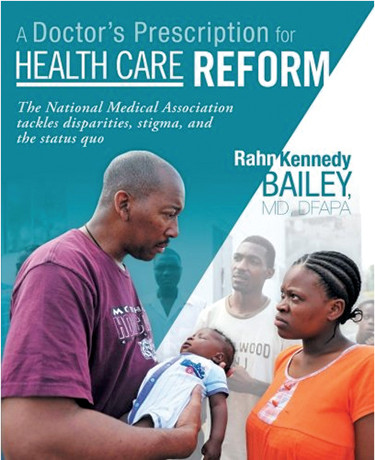The much discussed and debated Affordable Care Act (ACA) occupies the center of attention in this book. The primary author, Rahn Kennedy Bailey, is chair of the Department of Psychiatry at Meharry Medical College. The book is designed to pay homage to his tenure as the 113th president of the National Medical Association (NMA). From this platform, he informs the reader about the unequal burden of ill health experienced by African Americans and about plausible strategies to reduce, and possibly eliminate, such inequities. The intended audience starts with members of the NMA, but the issues addressed carry a wider appeal.
This book serves the aims of its author rather than attempting to be scientifically authoritative about the ACA as a controversial matter. The first four chapters cover generalities about the nature of existing health disparities and the relevance of the ACA to address them. Chapters five to nine target specific health conditions and discuss gun violence, major depressive disorders, and medical challenges faced by seniors. In contrast to the predominant orientation on domestic health problems and policies, one chapter offers a global perspective that does not sit well with the ACA thesis. The last chapter concludes with a three-part “prescription” in which the NMA is urged to vigorously advocate to eliminate health disparities, remove the stigma associated with mental illness, and enable greater access to health care services for historically disadvantaged populations. An epilogue is provided along with an impressive list of NMA presidents dating back to 1895. As president, Dr. Bailey supplies a letter, which reads as a presidential address, to his colleagues. This epilogue could just as well have served as a prologue because it orients the reader to the NMA and its history.
The highlights of this book are the three chapters concerning attention deficit hyperactivity disorder, major depressive disorder, and problems encountered in the use of antipsychotic drugs in African American patients. While these chapters do not intend to represent systematic reviews of the literature, they provide an important perspective on the functioning of racial biases in clinical decision making. A chapter titled “The Voice of Black Doctors on Reform” is devoted to a survey of attitudes and experiences of NMA members with regard to the ACA. However, sampling bias and a response rate of less than 5% disqualify the accuracy of the intended results of the survey.
Collectively, the value of this book rests in what it does to orient and inform the NMA’s role as an advocacy organization. It would have been useful if the book had given some background on the organization’s mission in areas such as patient education, lobbying, and policy briefs, which would have provided a historical context to the author’s rhetorical formulation.
One of the oddities about this book is that more than half the chapters are coauthored, yet there is no acknowledgment of the contributions, and there is not any reference to the professional affiliations of these coauthors. This oversight is rendered all the more curious given the separate sections in which family and colleagues are acknowledged, as well as contributors from fellow faculty members at Meharry.
Another inconsistency is the insertion of 18 full-page photographs showing Dr. Bailey on medical missions to Haiti, Liberia, and Botswana. These photographs are dispersed throughout the book with no explicit links to the text. The presumption is that Dr. Bailey intends to reveal the international, if not global, reach of the NMA. The photographs are too appealing and occupy too dominant a space in the book to be left out of the narrative. It seems that one objective of these photographs is to demonstrate solidarity with other populations who are of African descent. It may be that a unique contribution of Dr. Bailey’s leadership is to expand the vision and activities of the NMA from exclusively domestic concerns to an international arena. If this is the case, it would have been good to be explicit in providing narrative accounts of these international expeditions.


